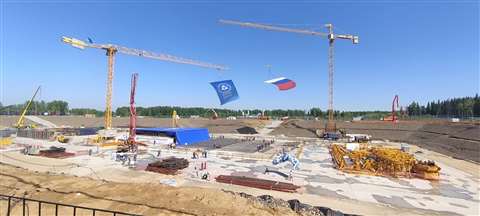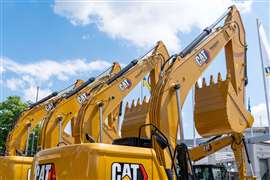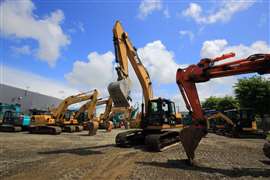Students build foundation for advanced Russian reactor
24 August 2021
Nuclear industry construction students undertake 26-hour concrete pour at energy-saving plant
 Construction is ongoing at Rosatom’s new fast neutron reactor in Seversk, Siberia
Construction is ongoing at Rosatom’s new fast neutron reactor in Seversk, Siberia
Students from across Russia have assisted in the concreting of the foundation slab at the country’s ambitious BREST-OD-300 fast neutron reactor project, part of Russia’s Siberian Chemical Combine (SCC).
A total of 255 students, training to join the nuclear industry, travelled to Seversk, in the Tomsk region of Siberia, to work on the plant, part of a pilot scheme aimed at demonstrating the efficacy of a closed fuel cycle, in which the lead-cooled reactor is supported by fuel fabrication and recycling on a single site.
In one continuous pour, lasting 26 hours, 18 teams of students built the reactor’s foundation slab, comprising some 2855m3 of heavy concrete.
The students operated under the guidance of experienced installers from the project’s general contractor Titan-2, which is working on the facility under the auspices of the developer Rosatom.
Titan-2’s Maxim Yakovlev said the students would contribute approximately 10 to 11% of the overall construction process.
According to Alexander Gusev, SCC Deputy General Director, the students’ tasks on the project would include aiding with the installation of the fuel fabrication-refabrication module, as well as the turbine hall of the power unit, plus the erection of walls and the backfilling of the foundation.
Sergey Kotov, SCC general director said, “The arrival of so many students is a great emotional responsibility at our construction site. The guys are here to master construction professions, our colleagues and technologists oversee their production and give them lectures.
“We will take note of the guys who want to connect their lives with the plant, and we will build further career paths for them.”
Rosatom director general Alexey Likhachev said of the project, “The nuclear power industry’s resource base will practically become inexhaustible thanks to the infinite reprocessing of nuclear fuel. At the same time, the future generations will be spared the problem of accumulating used nuclear fuel.”
The reactor is expected to begin operation in 2026, with the fuel fabrication module completed by 2023 and construction of the fuel reprocessing module scheduled to start by 2024.







